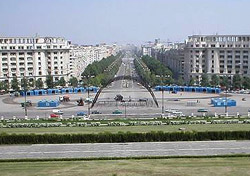After the meeting of the Armenian and Azerbaijani presidents in Rambouillet back in February of this year, the word Rambouillet is no longer known as a special name or the name of a castle. Rambouillet is a clear and simple word, which…No, don’t open the dictionary because it’s a new word and you won’t find it anywhere. Rambouillet is a clear and simple word, an abstract and concrete noun meaning: failure of an impossible process.
This is not a unique case in the Armenian language. There are other cases when the proper name turns into a common noun, even a verb. For example, “Xerox”, which is the name of a company producing electronic appliances. Armenians call the first imported copying machines as “Xerox” and say the verb “to copy” as to Xerox or do Xerox. There was also a time when we used to call all cars similar to Jeeps “Willis” thanks to the loot after World War II. Many people call a chainsaw “Druzhba”, without even differing between the Soviet one, the Czech, or Italian. This is what they call the only chainsaw during the Soviet era; the chainsaw, which signaled the relations between Soviet countries, including Armenia and Azerbaijan.
If the proper nouns Xerox, “Willis” and “Druzhba” suddenly turned into common nouns thanks to the greediness of people living in the secular Soviet society, then “Rambouillet” is the symbol of the impotence of the free world.
The Armenian and Azerbaijani presidents are being asked to do something, which they don’t want to do. In fact, that something goes against the political interests of each side. So, they can’t do that. But Rambouillet is not the kind of situation, whether that be in the French castle, Bucharest or Budapest, where the negotiators announce that “they can’t and don’t want to”. They must stick to the details, thus contrasting the one and only truth: establishment of peace is inevitable.
If the intermediary co-chairmen set a goal to establish peace and not just resolve the conflict, as it is said in all the announcements, then the Rambouillet meeting will not repeat. But it goes on and on because the co-chairmen can’t solve their own conflicts as they often bring up issues concerning dominance and not amity.
It’s evident that the U.S. is worried over the “Baku-Tbilisi-Jeyhan” oil route security. It would be better to solve that issue by territorial integrity and not the self-determination principle. This benefits two of the three oil routes. Russia is worried about its integrity and is doing its best to keep the influence on the Southern Caucasus. If Russia goes along with the self-determination principle, it will win Southern Osia and Abkhazia, but it will lose Chechnya and I don’t know how much more. If Russia goes along with the territorial integrity principle, it will be forced to see Georgia rising out of the ashes and Russia doesn’t want that. Russia also wouldn’t want to see Azerbaijan getting stronger. Russia will finally lose two of the Southern Caucasus countries for the sake of Chechnya and what not. Armenia will turn into a storage room for Russia to store its old and extra armaments. It seems as though France, which represents the European Union, doesn’t have similar gains. The European Union doesn’t want to hear noise from the neighboring countries and have Russia be as weak as it can.
So, this intermediary mission can’t be successful because there is no basis for the establishment of peace. Perhaps there is a political approach, or the desire to resolve something for the sake of something else, but there is no sign of peace in the context.
I don’t know why American co-chairman of the OSCE Minsk group Steven Mann is resigning, but I can predict that the experienced political figure has realized that the process is based on the Rambouillet meeting. However, he is the only co-chairman to announce that there is a need to get both societies ready. He has realized that no matter how precious and important the oil route is for his Homeland, if the societies are not prepared, the conflict will not be resolved, but rather will change and this is dangerous for the route.
Unfortunately, Steven Mann resigned personally and didn’t suggest the U.S. to leave the co-chairmen trio or have the trio disband and form a new team consisting of countries that play a role in the world but with no interests in the Southern Caucasus region. Canada, the Czech Republic and South Korea can be part of the new format.
The selection of this trio may seem by chance, but it’s not. Canada was faced with the Quebec issue and the country solved that issue by a referendum conducted in 1995 (49.4%-50.6% relativity) for the sake of territorial integrity. The Czech Republic has experience in “divorcing”, while Korea is faced with the issue of uniting a split country. Korea probably doesn’t realize that the two Koreas go hand in hand. The important thing is that neither of the three has shown itself capable of solving issues. In a situation like this, the new co-chairmen will not focus on political issues, but rather humanitarian.

